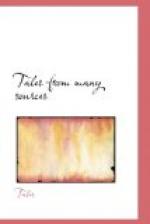He was wandering about one day when he came to some fine high walls with buildings inside. There was an open gateway, at which stood a soldier with a musket. But a woman and some children went in, and he did not shoot them; so when his back was turned, and he was walking stiffly to where he came from, John Broom ran in through the gateway.
The first man he saw was the grandest-looking man he had ever seen. Indeed, he looked more like a bird than a man—a big bird with a big black crest. He was very tall. His feet were broad and white, like the feathered feet of some plumy bird, his legs were bare and brown and hairy. He was clothed in many colours. He had fur in front, which swung as he walked, and silver and shining stones about him. He held his head very high and from it drooped great black plumes. His face looked as if it had been cut—roughly but artistically—out of a block of old wood, and his eyes were the colour of a summer sky. And John Broom felt as he had felt when he first saw Miss Betty’s cockatoo.
In repose the Highlander’s eye was as clear as a cairngorm and as cold, but when it fell upon John Broom it took a twinkle not quite unlike the twinkle in the one eye of the sailor; and then, to his amazement, this grand creature beckoned to John Broom with a rather dirty hand.
“Yes, sir,” said John Broom, staring up at the splendid giant, with eyes of wonder.
“I’m saying,” said the Highlander, confidentially (and it had a pleasant homely sound to hear him speak like the farm-bailiff)—“I’m saying, I’m confined to barracks, ye ken; and I’ll gi’e ye a hawpenny if ye’ll get the bottle filled wi’ whusky. Roun’ yon corner ye’ll see the ’Britain’s Defenders.’”
But at this moment he erected himself, his turquoise eyes looked straight before them, and he put his hand to his head and moved it slowly away again, as a young man with more swinging grandeur of colors and fur and plumes, and with greater glittering of gems and silver, passed by, a sword clattering after him.
Meanwhile John Broom had been round the corner and was back again.
“What for are ye stan’in’ there, ye fule?” asked his new friend. “What for didna ye gang for the whusky?”
“It’s here, sir.”
“My certy, ye dinna let the grass grow under your feet,” said the Highlander; and he added, “If ye want to run errands, laddie, ye can come back again.”
It was the beginning of a fresh life for John Broom. With many other idle or homeless boys he now haunted the barracks, and ran errands for the soldiers. His fleetness of foot and ready wit made him the favourite. Perhaps, too, his youth and his bright face and eyes pleaded for him, for British soldiers are a tender-hearted race.
He was knocked about, but never cruelly, and he got plenty of coppers and broken victuals, and now and then an old cap or pair of boots, a world too large for him. His principal errands were to fetch liquor for the soldiers. In arms and pockets he would sometimes carry a dozen bottles at once, and fly back from the canteen or public-house without breaking one.




